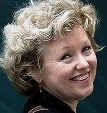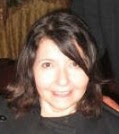By Kathi Diamant
 |
| Kathi Diamant at the United States Botanical Garden, in Washington DC (part of the fun of research) |
As I write this, I’m halfway through a research grant. I am writing an article, and eventually a book, about my search for a lost literary treasure: the missing last writings of Franz Kafka, stolen by the Gestapo in Berlin 1933. I’m in Washington, DC for two more weeks, in residence at the Woodrow Wilson International Center for Scholars, and feeling Time rush by with no regard for all I still have to accomplish.
I am sitting at Carrel #2, which consists of a little desk with a computer in the 6th floor Reading Room, surrounded by other researchers, who sit to the left and right of me, also typing busily away. I just peeked at the surrounding computers, and no one is playing Free Cell or looking at their Facebook page. Everyone is serious around here.
In fact, just to show how serious I am, I did research for this blog post, and just reread Georgeanne Irvine’s offering from last July, entitled “Methods to Get My Writing Juices Flowing.” Like George, my absolute favorite aspect of writing is the research phase. Omitting the “observing animals” part, I too enjoy “interviewing people, gathering and analyzing facts, searching for information, visiting sites, studying archives” as the most invigorating part of the writing process. Except when it isn’t.
But before I get into all that, let me first give a plug for grants.
Getting a grant to conduct the research you need to knowledgeably set the scene, whether historical, geographical, or cultural, is an excellent idea on several levels. Not to say writing a grant is easy, but it is doable. If you are in San Diego, spend an afternoon at San Diego Foundation at Liberty Station, and you’ll find hundreds of books filled with available grants in every subject imaginable. (If you are not in San Diego, you can look in similar facilities in your own city, and increasingly, online.) Make a list of those that could possibly apply to you, checking your necessary qualifications (like being a US citizen, or a certain level of education), application dates and other criteria, and then write a quick letter of inquiry. Not all will answer you in the affirmative, but chances are good, some will. Then apply, following the grant instructions to the letter. The most important tip I can offer is to read and re-read the instructions, again and again, before, during and after writing the grant.
Having received three grants prior to this one, I can attest to the value a grant affords (beyond the cash, which for me, has ranged from $2,000 to $5,000). When you are trying to sell your book, whether in proposal form or already completed, having received a grant establishes you as someone whose idea is worthy of support. It adds prestige, and acreage to your “platform” which as we are now all aware, is an author’s new best friend. And it can make your writing more descriptive, informative and accurate.
My current grant required a month’s residence in Washington DC at the Woodrow Wilson Center, which grants me access to all sorts of libraries, archives and experts. I have conducted a dozen interviews, and spent hours at the Library of Congress, National Archives and the research facilities at the US Holocaust Memorial Museum. I am taking copious notes, and searching out new sources of information, based on what I’ve just discovered. On my own time, I am conducting a different sort of research—specifically on the best restaurants in the historic Capitol Hill neighborhood where I am renting a room, and on which Smithsonian institution I like best. That is the fun part.
The not-so-fun part is the slog. The endless typing-up of pages of my unreadable scribbled notes, and the necessary follow-up of questions not fully answered. Analyzing what I’ve gathered and finding no conclusions, only more questions. Phone calls and emails that don’t get returned or answered. Being overwhelmed at the ceiling-high reams of information on one hand, and on the other, the dearth of details on what I really need to know. I could go on. But thank goodness, blog posts should not.
I’m in the midst of it now, but I know that the memory of the slog evaporates, while a grant’s gains can be immeasurably important, offering an opportunity to fully explore the story you want to tell. Despite my last paragraph, I heartily recommend you research one for yourself. And let me know if I can offer advice. The only thing more fun than gaining knowledge is sharing it!
Kathi Diamant is the author of "Kafka's Last Love: The Mystery of Dora Diamant" and the director of the Kafka Project at San Diego State University, where she is an adjunct professor. When she returns from her stint at the Woodrow Wilson International Center for Scholars, she will be preparing for her class "Kafka in Context" LTEU 130, at UCSD in the Spring, and her Magical Mystery Literary History Tour this summer.












0 comments:
Post a Comment